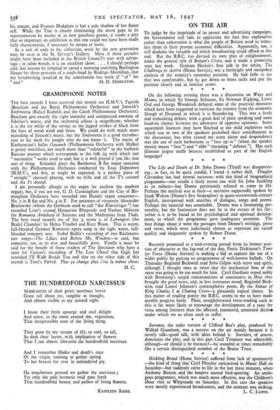ON THE AIR
To judge by the ineptitude of its poster and advertising campaigns, the Government still fails to appreciate the fact that explanation rather than exhortation is what the people of Britain need to stimu- late them in their present economic difficulties. Apparently, too, it still disdains the valuable aid which broadcasting could afford to this end. But the B.B.C. has devised its own plan of enlightenment, under the general title of Britain's Crisis, and it made a promising start last week. Graham Hutton's first talk in the series, The Challenge to Action (Home Service), was a forthright and outspoken start last week. Graham Hutton's first talk in the series, The Challenge to Action (Home Service), was a forthright and outspoken
analysis of the country's economic position. He had little to say that was comfortable, but he got down to brass tacks and put the position clearly and in familiar terms. * * * *
On the following evening there was a discussion on Ways and Means, in which Sir George Schuster, Sir Norman Kipping, Lewis Ord and George Woodcock debated some of the practical measures which have been suggested to extricate the country from the economic Slough of Despond in which it is floundering. This was a lively and stimulating debate, with a good deal of plain speaking and some head-on clashes between the advocates of opposite opinions. Some squeamish listeners may have flinched at the mild expletives with which one or two of the speakers garnished their contributions to the discussion, but what caused me acute alarm and despondency was the use of such barbarisms as " face up to " (when the speaker merely meant " face ") and " alibi " (meaning " defence "). Has such illiterate jargon really become established as part of the English
language? • * * * *
The Life and" Death of Dr. john Donne (Third) was disappoint- ing ; in fact, to be quite candid, I found it rather dull. Douglas Cleverdon has had several successes with this kind of biographical programme—one recalls a fairly recent one with Sir John Suckling as its subject—but Donne persistently refused to come to life. Perhaps the method was at fault—a narrative supposedly spoken by Izaak Walton (Donne's first biographer) in quasi-seventeenth-century English, interspersed with snatches of dialogue, songs and poems. Perhaps the material was unsuitable. Donne was a fascinating per- sonality, but the fascination does not lie in the events of his life ; rather is it to be found in his psychological and spiritual develop- ment, to which the programme gave inadequate attention. The best things about it were the passages from Donne's writings, prose and verse, which were judiciously chosen to represent his varied quality and eloquently spoken by Robert Donat. -
* * * *
Recently promoted to a mid-evening period from its former posi- tion of obscurity at the fag-end of the day, Patric Dickinson's Time for Verse (Home Service) is making a bid to capture the ear of a wider public by putting on programmes of well-known ballads. On Thursday Reginald Beckwith read john Gilpin with verve and spirit, although I thought once or twice that the mechanical beat of the verse was going to be too much for him. Cyril Gardiner coped nobly with Browning's turgid concatenations of consonants in How they brought the good news, and, in less strenuous mood, Reginald Beck- with read Lionel Johnson's contemplative poem, By the Statue of King Charles I at Charing Cross—a pleasantly topical choice. In this matter of reading poetry the B.B.C. seems to me to have made notable progress lately. Plain, straightforward verse-reading such as this is far more likely to encourage the. development, of a taste for verse among listeners than the affected, mannered, unnatural diction
under which we so often used to suffer.
* * * *
Socrates, the radio version of Clifford Bax's play, produced by Wilfrid Grantham, was a success on the air mainly because it is mostly talk—good talk, with ideas behind it. Socrates, of course, dominates the play, and in this part Cecil Trouncer was admirable, although—or should it be because?—he sounded at times remarkably
like a certain distinguished member of the Brains Trust. * *. * *
Hickling Broad (Home Service) suffered from lack of spontaneity —the kind of thing that Cyril Fletcher caricatured in Music Hall on Saturday—but suddenly came to life in the last three minutes, when Anthony Buxton and the keepers started bird-spotting. An analo- gous programme, which was much more effective, was the Children's Hour visit to thipsnade on Saturday. In this case the speakers were mostly experienced broadcasters, and the contrast was striking. L. C. LLOYD.


































 Previous page
Previous page